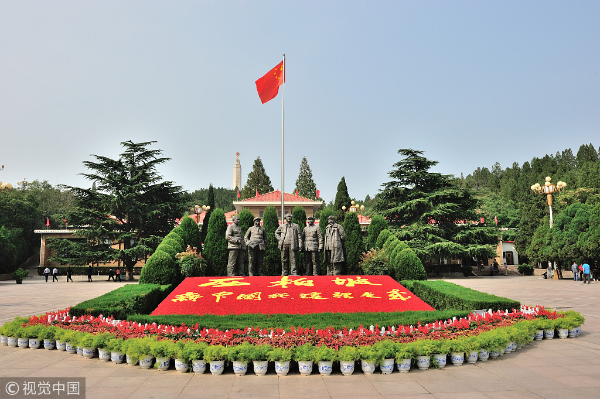Xibaipo Memorial

Xibaipo Memorial
西柏坡纪念馆
Address: Xibaipo Village, Pingshan county, Hebei Province
Website: www.xbpjng.cn/
Hours: 9:00-17:00 (no entry after 16:30)
Tel: (+86-311)82851355
Admission fee: Free (passport required for entry)

[Photo/VCG]
The Xibaipo Memorial is located in the mountain village of Xibaipo, 500 meters north of the site where the central committee of the Chinese Communist Party had worked before the People's Republic of China was founded in 1949 and the central government moved to Beiping (today's Beijing). Xibaipo was the headquarters of the Working Committee and the Central Committee of the CCP, as well as the command center of Chinese Liberation Army du from 1947 to 1948. It was the command center for the liberation of China and the preparation of new China. Therefore it has gained the reputation of being "he place where new China has come from". The memorial occupies a construction area of 3,344 square meters.
A series of historically significant incidents took place here, including the conference that inaugurated national land reform, the commanding and manoeuvre of armies in the three major defining battles for China's ultimate liberation, and the second Plenum Session of the Seventh CPC Central Committee which discussed the basic policies for the new China.
In 1955, a preparatory office for the memorial hall was set up. Construction work on exhibition halls for the Xibaipo Memorial started in October 1976 and opened to the public on May 26, 1978. Deng Xiaoping (1904-1997) inscribed the name of the memorial on its plaque in 1984.
The memorial houses abundant historical artifacts, of which over 2,000 are related to China’s revolution. Displays include reconstructions of revolutionary sites and documents, photos and mementos recording the revolutionary years.
The collections in the memorial hall feature items used by the founding fathers of the CPC and former national leaders, including an office desk and a swivel chair used by Mao Zedong (1893-1976), a document box used by Liu Shaoqi (1898-1969), a metallic desk and chairs used by Zhu De (1886-1976), a blanket of Dong Biwu (1886-1975), a bookshelf of Zhou Enlai (1898-1976), and a pocket watch of Ren Bishi (1904-1950).







